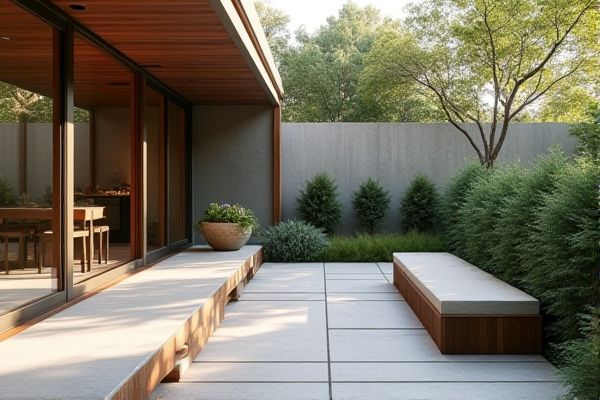
A slim bench offers a sleek, space-saving design ideal for narrow terraces, while a wide bench provides more seating and comfort for larger outdoor areas. Discover which bench style best suits your terrace and personal taste by reading the rest of this article.
Table of Comparison
| Feature | Slim Bench | Wide Bench (Terrace) |
|---|---|---|
| Design | Narrow, minimalist profile | Broad, spacious seating area |
| Space Efficiency | Ideal for small spaces and tight areas | Requires more room, suited for open terraces |
| Comfort | Less seating surface, suitable for brief use | More comfortable for extended seating |
| Use Case | Indoor corridors, narrow gardens | Outdoor terraces, patios, wide decks |
| Material Options | Wood, metal, compact cushions | Wood, concrete, stone, cushioned options |
| Weight Capacity | Moderate, supports fewer users | High, built for multiple users simultaneously |
| Cost | Generally lower due to size | Higher due to material quantity and construction |
Introduction: Evaluating Slim vs. Wide Benches for Terraces
Choosing between a slim bench and a wide bench for your terrace hinges on available space and intended use; slim benches offer elegant, space-saving seating ideal for narrow areas, while wide benches provide comfortable lounging with more room to spread out. Materials like weather-resistant wood or metal enhance durability, and cushioning options can further optimize comfort tailored to your outdoor needs. Assessing both style and function ensures your terrace bench complements your space while maximizing usability.
Space Efficiency: Maximizing Terrace Real Estate
Slim benches optimize terrace real estate by occupying minimal floor space while providing adequate seating, perfect for narrow or compact areas. Wide benches offer enhanced comfort and additional storage options but require more terrace space, potentially limiting other uses. Selecting between slim and wide benches depends on balancing seating needs with available terrace dimensions to maximize space efficiency.
Comfort Comparison: Seating Experience on Slim and Wide Benches
Slim benches offer a more compact seating option, providing close contact and a cozy feel ideal for small spaces, though they may feel cramped for extended use. Wide benches deliver enhanced comfort with ample space, allowing users to stretch and adjust positions easily, making them suitable for longer seating periods. The choice between slim and wide benches hinges on balancing spatial constraints with desired seating comfort and user experience.
Aesthetic Impact: Design Versatility and Style
A slim bench offers a sleek, minimalist aesthetic that enhances modern and compact terrace designs, maximizing space without overwhelming the area. Wide benches provide a bold statement piece, contributing to a more substantial, inviting atmosphere suitable for larger terraces or outdoor lounges. Your choice between slim and wide benches directly influences the terrace's style, balancing functionality with the desired visual impact.
Functionality: Uses and Flexibility for Terrace Settings
Slim benches maximize space efficiency on narrow terraces, offering functional seating without crowding, ideal for small gatherings or solo relaxation. Wide benches provide enhanced comfort and versatility, accommodating multiple users and serving as additional storage or planter space, thus adapting to varied terrace activities. Both styles optimize terrace utility but cater to different spatial and functional needs, balancing comfort with design constraints.
Material Considerations for Each Bench Type
Slim benches typically use lightweight materials such as aluminum or treated wood, offering sleek design and ease of maintenance, ideal for compact terraces. Wide benches often incorporate sturdier materials like solid hardwood or concrete, providing enhanced durability and stability for larger outdoor spaces. You should consider the balance between material strength and aesthetic appeal based on your terrace size and desired bench function.
Installation and Maintenance Differences
Slim bench terraces feature narrower seating surfaces that require precise alignment during installation, often demanding more support brackets and specialized fasteners to ensure stability. Wide bench terraces offer simpler installation with broader planks, reducing the number of joints and potentially lowering labor time and material costs. Maintenance for slim benches involves more frequent inspections for joint integrity and tightening hardware, whereas wide benches typically allow easier surface cleaning and fewer points of failure, thus minimizing upkeep efforts.
Durability and Weather Resistance
A wide bench terrace often provides enhanced durability due to its robust construction and thicker materials, better resisting wear from heavy usage and environmental stress. Slim benches may utilize lighter materials, which can be more vulnerable to weather-related damage like warping or cracking under prolonged exposure to moisture and sunlight. To ensure your terrace furniture lasts, choosing weather-resistant finishes and materials such as treated wood or metal with protective coatings is essential for both slim and wide bench designs.
Cost Analysis: Budgeting for Slim vs. Wide Benches
Slim benches typically cost less due to reduced material usage and simpler manufacturing, making them a budget-friendly choice for smaller terraces. Wide benches, while more expensive upfront, offer greater seating capacity and comfort, potentially reducing the need for additional furniture investments. Your decision should balance immediate costs with long-term value, considering your terrace size and expected usage.
Choosing the Right Bench for Your Terrace Needs
Selecting the ideal bench for your terrace depends on available space and functional requirements. Slim benches offer a compact seating solution perfect for narrow terraces, optimizing space without sacrificing comfort. Wide benches provide ample seating and can double as storage, making them ideal for larger terraces or entertaining areas where extra room and versatility are essential.
 homyna.com
homyna.com